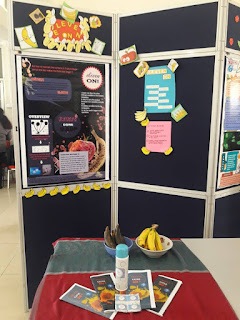E-Portfolio BMY3101 - Week 5
This week we were given a group task to choose a prokaryote and to make a presentation about the prokaryote. We had chose Serratia marcescens which is a motile,short rod-shaped, Gram-negative, facultative anaerobe
bacterium, classified as an opportunistic pathogen. It was discovered in 1819
by Bartolomeo Bizio in Padua, Italy. Bizio named the genus Serratia in honor of
and Italian physicist named Serratia, and chose marcescens for the species name
after the Latin word for decay.
S. marcescens was first thought to be harmless (non-pathogenic). Due to its
ability to produce red pigmentation, it was first used in 1906 as a marker in
order to trace bacterial activity or transmission. It was not until later in
the 1950’s that the US government experimented with the S. marcescens and
the harmful effects that the bacteria causes were revealed. A study using
S. marcescens was carried out to determine the possibility of biological
weapons being transmitted by wind current.
S. marcescens is short and rod shaped. It is a
facultative anaerobe, meaning that it can grow in either the presence of oxygen
(aerobic) or in the absence of oxygen (anaerobic). Primarily it uses
fermentation as the means of gathering energy and has enzymes (superoxide
dismutase, catalase or peroxides) that protect it from reactive oxygen species,
allowing it to live in oxygenated environments. S. marcescens is a gram
negative bacterium. Gram negative bacteria have a thin cell wall made of a
single layer of peptidoglycan that is enclosed by an outer membrane. The outer
membrane has lipopolysaccharides (LPS), which are a special kind of
phospholipid composed of fatty acids that are attached to a glucosamine
phosphate dimer. S. marcescens is ubiquitous. It is commonly found in soil, water, plants and
animals. It is widely present in non potable water in underdeveloped countries
due to poor chlorination.
 |
| Picture of S. marcescens culture on agar plate surface |

Ulasan
Catat Ulasan